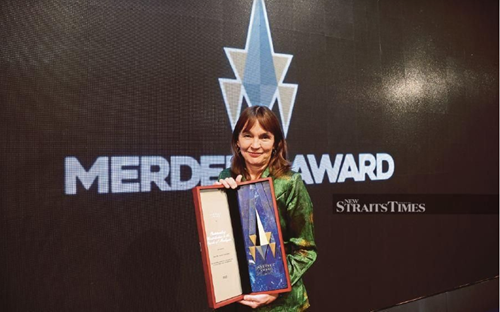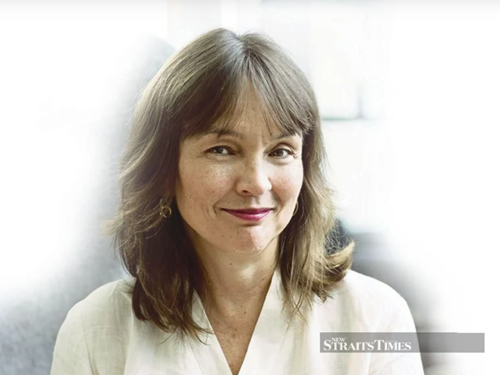Merdeka Award 2022 recipient Datuk Dr Annabel Teh Gallop digitised 120 Malay manuscripts so that they are easily accessible to all.
THE works and initiatives of the British Library curator, Datuk Dr Annabel Teh Gallop, have given a new life to old Malay manuscripts, some of which are fragile and sit in libraries and are normally accessed by scholars or those really interested in them.
Thirty-six years in the job, as the curator of the Malay and Indonesian collections at the British Library, Gallop has the privilege of working on extraordinarily important historical Malay materials, like the old Malay manuscripts, seals and letters.
She even published a catalogue of Malay seals in 2019, titled Malay Seals from the Islamic World of Southeast Asia, from her PhD research. It's a catalogue comprising over 2,000 Malay seals, which she defines as seals with inscriptions in Arabic script, Arabic Jawi script, and they span four centuries, from the 16th to the early 20th century.
INTEREST IN MALAY MANUSCRIPTS
Gallop's interest in the Malay writing traditions and culture started way back during her university years, and could be linked to her family background.
"'Teh' is the Malaysian part of me. My mother is Teh Siok Lay, a Hokkien who hails from a small village called Changlun in Kedah, and my father Christopher Hugh Gallop, is British. They got married in Penang and I was born in England in 1961. When I was young, my parents relocated to Brunei, so I was brought up in Brunei Darussalam. We used to travel back to Kedah regularly for the holidays because my grandfather owned a house in Pekan Lama, Changlun," she recalled.
Gallop went to schools in Brunei until she was a teenager, before going back to the UK to further her education.
She didn't study Malay literature initially in university. She took up Maths at Bristol University, but towards the end she realised that it wasn't for her.
"I was just fuelled by deep interest in Southeast Asia, in the Malay world, in Indonesia, where I'd spent seven to eight months in my gap year teaching English. So I changed direction, 180 degrees academically. I enrolled in the School of Oriental and African Studies at London University and did an MA in Indonesian and Malay studies," she said.
"I loved the course and felt as if I had come 'home'. Since then I have always felt so fortunate that I was able to rectify my earlier choice. Discovering rare Malay books, documents, letters, manuscripts and seals — in libraries, archives or museums all over the world — never ceases to thrill me," said Gallop, who can also read Jawi fluently.
Gallop got a job at the BBC after graduating, but within a year, an opportunity came up at the British Library, as a curator of the Malay and Indonesian collections.
"At the time I didn't know that much about the collections, but the longer I stayed in the job, the more fascinating I found them. And I'm still here, in the same job, 36 years later. That shows you just how much I love this job. I suppose the reason I enjoy working on Malay writing traditions, history, and culture, and the culture of the whole Malay world is because there's always something new," said Gallop.
From that moment on she has been embarking on the "adventure" of culture and the writing traditions of the Malay world.
In her research, Gallop always chooses something new — topics that have not been studied before as she thinks that the way to make the greatest contribution is to draw people's attention.
"There are some manuscripts which are very famous, we all know Hikayat Hang Tuah, Sejarah Melayu, Undang-Undang Melaka, but I try to look at other texts as well as materials that have not been studied before."
TECH EFFECT
Although Gallop has been with the British Library for a long time, it's only in the past 10 years that there's been a major change in what she's doing — because of technology.
 Datuk Dr Annabel Teh Gallop with her 2022 Merdeka Award — Outstanding Contribution to the People of Malaysia.
Datuk Dr Annabel Teh Gallop with her 2022 Merdeka Award — Outstanding Contribution to the People of Malaysia.
"We still do the traditional things. We catalogue, buy new books. People come to the library to read manuscripts, to read books, but it's technology that has changed our lives and the Internet," she said, and that's when she started digitising the Malay manuscripts.
"When it comes to libraries and book collections, digitisation means that we can digitise materials and they can now be read in a very high resolution, fully and free from the beginning to the end, and from anywhere in the world," she said.
"Before, those studying the Malay manuscripts had to travel all the way to London just to read our manuscripts, ordered in microfilm that was just black and white, and quite difficult to use," she explained.
But now that the Malay manuscripts are digitised (120 of them), the final group of collaborators are the readers.
Gallop said digitisation was only of use if the images are accessed and read.
"We know from website statistics that our biggest group of readers in the world for our Malay manuscripts are based in Malaysia. I believe these readers and researchers, comprising scholars (young and old) and ordinary Malaysians who care about history and heritage, make use of these manuscripts and disseminate the content and values in many different ways. Who thus embody the true spirit of Merdeka," she said.
DIGITISING THE MANUSCRIPTS
As curator, Gallop identified all the 120 Malay manuscripts to be digitised and catalogued them online.
"Then our conservators checked all the manuscripts individually to ensure that they were in good enough condition to be photographed, by cleaning them to remove any dust, and to make the necessary repairs," she said.
After the conservation check, the manuscripts were brought to the imaging studio and photographed from cover to cover, including the bindings. After that, all digital images — which numbered over 20,000 — had to be checked one by one by a digitisation officer to ensure that they were in focus, the right way up, and that the colour and lighting were consistent.
The final stage was to publish the manuscripts online, that are accessible on the British Library's website: https://blogs.bl.uk/asian-and-african/malay.html
"I should stress that in the British Library we do not 'scan' manuscripts. We photograph them. Manuscripts are too precious and fragile to place on a scanning machine, so our highly trained photographers will photograph each page, turning the leaves of the book carefully by hand.
"As you can imagine, it therefore takes a long time to digitise a manuscript, and involves a large team of people, who come together to work on different aspects," explained Gallop.
Needless to say, digitisation is a very expensive process, involving many hours of work and many different specialists.
"Therefore, we are very grateful for the generous support of American philanthropists and bankers, Judith and William Bollinger, who funded the project. So all the 120 Malay manuscripts in the British Library have now been digitised, and can be read from anywhere in the world," she said.
CONNECTING WITH NEW AUDIENCE VIA SOCIAL MEDIA
Besides the digitisation project, Gallop also found social media — blogs, Facebook and Twitter — as important means of connecting directly with new audiences, and helping to make the British Library's Malay collections well known and relevant to the younger generation and those outside the academic world.
"Of course, our digitised Malay manuscripts are well used by more traditional categories of users — academics and scholars in the universities, and Dewan Bahasa dan Pustaka (DBP). For example, one of our manuscripts, Hikayat Ular Nangkawang, was recently published by DBP based on the digitised manuscripts. But I am even more delighted when our manuscripts reach out to non-traditional audiences through independent publishers like Fixi, that have published two British Library manuscripts, Hikayat Raja Babi and Hikayat Nabi Yusuf, in romanised versions," she said.
Gallop recently wrote a blog about all the different users of the digitised Malay manuscripts, not just in Malaysia but also in Indonesia, Singapore and Brunei, which can be accessed at https://blogs.bl.uk/asian-and-african/2021/10/who-reads-digitised-malay-...

Datuk Dr Annabel Teh Gallop
THE MERDEKA AWARD
Gallop was recently awarded the 2022 Merdeka Award for Outstanding Contribution to the People of Malaysia by Sultan Nazrin Muizzuddin Shah, who is the royal patron and chairman of the Merdeka Award Trust.
The Merdeka Award was established in 2007 to recognise and reward individuals and organisations whose works and achievements have contributed to the nation's growth and inspired greatness in the people.
"This recognition is not just an appreciation of my work, but it is also a confirmation that Malay books, documents, letters, manuscripts and seals, which tell us about Malaysian history, are important. It empowers me to continue sharing the outcomes of my research and the Malay world with a larger audience, especially the younger generation," she said.